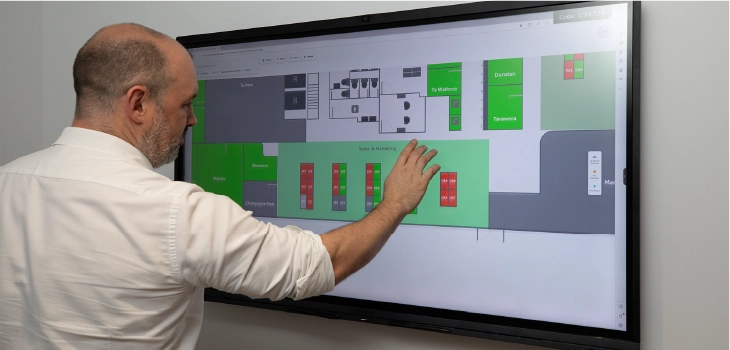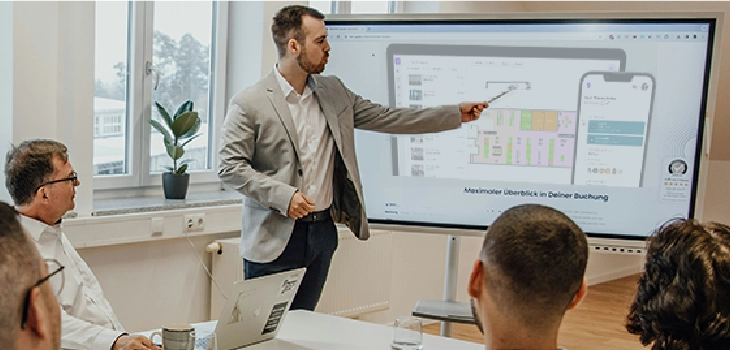In part one of this mini-series, we covered some of the Hybrid Workplace trends to look for in 2024. In this follow-up, we will investigate the approach required to adapt to those trends and maintain a 'workplace that works'.
We've established that Hybrid Workplace solutions are not only necessary but non-negotiable. It's about orchestrating a symphony of technologies to create an environment where employees have the support and tools they need to excel and a reason to come into the office.
As we continue forward into the Hybrid age with employees increasingly working from varied locations—homes, offices, and co-working spaces—the need for a Hybrid Workplace solution that unites these environments has never been more critical.
Identify and understand your needs
Developing the ideal Hybrid Workplace begins with a deep dive into your organisation's requirements. This calls for a comprehensive evaluation of your current challenges, business outcomes, future objectives, and the cultural landscape of your business.
By addressing the goals and challenges systematically and aligning the Hybrid Workplace solution with the company's strategic objectives and outcomes, organisations can create an environment that supports productivity, collaboration, and growth.
Assess current challenges and pain points
Start by working with your people across different areas of your organisation. They often have the best view of what's hindering their progress. Ask probing questions: Are there bottlenecks in your technology that hamper productivity? How long does it take to start a meeting? Do you spend a lot of time looking for a few desks or rooms in the office? Could it be that communication barriers between remote and on-site teams are causing delays? A real-world example of this might be a firm discovering that its remote project workers face frequent connectivity issues, leading to frustration and a drop in productivity.
Asking business leaders can provide different viewpoints. They are commonly focused on reducing costs and increasing productivity. Ask them questions such as: How do I know which technologies to invest in to support our business now and in the future? How do I optimise my assets and reduce costs to free up funds for investment in innovations? How do I free up time and create meaningful work for our employees? How is your office space currently being utilised?
Ensure alignment with your organisational goals and objectives
Your Hybrid Workplace solution must align with the strategic vision of your organisation. Whether your goals include scaling operations, enhancing innovation, boosting employee morale, improving collaboration and productivity, or improving customer satisfaction, your Hybrid Workplace solution must be a catalyst for these aspirations. You also need to consider the long-term goals of the company. Hybrid Workplace solutions should be scalable and flexible, allowing for growth and thrive in the new world of work.
Research available digital workplace solutions

Once you understand what you need, you can explore various digital workplace solutions, from full-suite platforms to specific tools catering to distinct needs. Let's delve into examples of popular digital workplace solutions to give you a head start.
Evaluate hybrid workplace features and functionalities
Focus on how their features can address your needs. Look for functionalities that support your people, whether that's user experience, creating the right environment for people to collaborate or ensuring technology works seamlessly in the background. Align the solutions with the pain points, challenges and goals you identified early in the journey. This prevents the adoption of technology that isn't fit for purpose or paying for features that won't deliver change. By referring back to your strategic needs, you can ensure that the company is well-positioned to meet its future objectives.
Examples of digital workplace technology
Hybrid workplace solutions comprise a wide range of tools and technologies designed to enhance productivity, collaboration, communication, and efficiency within organisations and create an environment that is accessible, inspiring, and productive. Here are some vital Hybrid Workplace solutions and how they provide value.
- Meeting solutions
Foster collaboration, increase productivity, provide a consistent user experience and, for a hybrid workforce, ensure meeting equity - that every attendee, whether in the office or remote, is seen and heard.
They need to 'just work' and be stable enough to start a meeting in seconds, allowing businesses to focus on core operations and their customers. For example, deploying Microsoft Teams Rooms can provide a consistent user experience across all room types and 'single touch start' capability while integrating with your existing M365 environment.
This not only reduces time wasted but eliminates the frustration and confusion that can occur when people struggle to connect. - Workspace management
Aims to digitally enhance spaces to enable hybrid work and allow businesses to respond to changes in how people work by delivering a seamless employee experience.
To do this, organisations are integrating activities such as desk booking, meeting room management, wayfinding, and more, giving employees the tools they need to collaborate in a modern workplace while empowering them to choose when they would like to come into the office.
For the business, usage data is captured and displayed in accessible dashboards. This unlocks new insights and the capabilities required to adjust ineffective ways of working, improve collaboration, and reduce costs – a workspace capable of evolution. - Smart devices
Empower people to work effectively by giving them the right tools for their specific roles. When an employee is equipped with a device designed for their particular job, they can accomplish tasks faster and with greater precision.
For example, a tablet can be a versatile tool for someone in a creative role, offering a digital canvas and the ability to work from anywhere. Videoconferencing technology connects team members across the globe, fostering collaboration regardless of physical location. Intelligent printers go beyond printing documents, automating document workflows, securely handling sensitive information, and even reordering supplies.
The right technology tools also ensure that security is not an afterthought, protecting your company's IP, reputation and finances.
Considerations when choosing the right digital workplace solution

With various options available, deciding on the right fit for your organisation can be overwhelming. Here's a checklist to guide your journey.
Making the final decision

Making the final decision should be a collaborative effort involving all key stakeholders while also considering the plusses and minuses of a Hybrid Workplace solution.
- Research and shortlist Hybrid Workplace solution providers: Conduct thorough research on prospective providers. Look for industry leaders who can provide a partnership approach to technology solutions. Will they be able to provide a long-term relationship to guide you through future technology changes and support you into the future?
- Request demos and trials: Reach out to your shortlisted partners and request demos or trials. This hands-on experience can reveal insights that brochures and sales pitches may not convey. Ask for evidence of where they've delivered solutions to an organisation similar to yours, and don't be afraid to ask 'obvious' questions or interrogate the information you are receiving. This process is as much about the vendor as it is about the solution; you want to develop confidence in both.
- Weigh the pros and cons: Create a matrix and objectively weigh the pros and cons of each solution based on all the above factors. Consider factors like user experience, performance, and partner support in your assessment.
- Involve key stakeholders in decision-making process: The decision-making process should be inclusive, considering the perspectives of employees who will be the end-users and the IT managers responsible for ensuring that the solution runs optimally and the business leaders focused on how to grow their business.
- Refer back to your goals: When you're reviewing your choices, always ensure you measure against what you've set out to achieve this project and that the offer from the partner is aligned.
Embrace the Hybrid future with the ideal Hybrid Workplace solution
The selection of a Hybrid Workplace solution is a catalyst for change that can impact every facet of your organisation. By investing in a robust Hybrid Workplace, businesses can ensure they are future-proofed and ready to embrace the full potential of an ever-evolving Hybrid world.
About the Author

Todd Vandenberg - GTM Lead, Hybrid Workplace - Ricoh APAC
For over two decades, Todd Vandenberg has been at the forefront of workplace and workstyle transformation in the Asia Pacific region, helping businesses solve complex collaboration challenges to achieve positive outcomes.
As Ricoh’s APAC Go-To-Market Manager for Hybrid Workplace, he is committed to delivering on the promise of effortless connectivity and collaboration across teams, workspaces, and locations.
Ready to Explore the Hybrid Workplace?
Discover more about creating better work experiences with seamless connectivity and collaboration across teams, workspaces, and locations.
Let's Connect
Let’s connect
Get in touch with one of our consultants and find out how we can support your growth through technology financing
Recommended resources for you

Making Work a Destination: Empowering Teams with Smarter Workspaces
RICOH Spaces transforms how teams work, integrating desk booking, meeting rooms, visitor management & IoT insights into one hybrid workplace solution.

Redefining the Destination Workplace: Why the C-Suite Must Lead the Hybrid Revolution
Discover how Ricoh Spaces helps leaders optimise space, enhance employee experience, and deliver measurable ESG impact.

Powering Workplace Collaboration: Bringing Modern Teams Rooms to Aotearoa
Upgrade Kiwi offices with Ricoh and Poly Teams Rooms; intuitive, inclusive hybrid meeting spaces powered by AI and backed by local NZ support.


